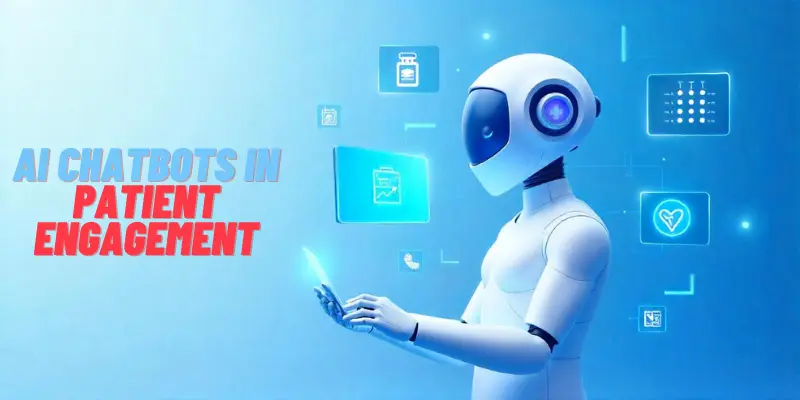How AI Chatbots Are Helping in Patient Engagement
Published: 3 Mar 2025
Have you ever felt confused after leaving the doctor’s office? Maybe you forgot what the doctor said. Or you didn’t know when your next visit was. This happens to many people. That’s why patient engagement is so important.
Patient engagement means patients take an active role in their health. They ask questions, follow instructions, and stay in touch with their care team. But busy schedules, long wait times, and confusing medical words often get in the way.
Here’s where AI chatbots come in. These smart tools can talk to patients, answer common questions, remind them about medicine, and even help book appointments. And the best part? They’re available 24/7.
In this blog, we will show how AI chatbots are helping people stay connected with their healthcare easily and quickly. Let’s get started!

What Are AI Chatbots in Healthcare?
AI chatbots are computer programs that can talk to patients just like a human and make AI in patient engagement very effective. They use artificial intelligence to understand questions and give helpful answers.
How They Work in Healthcare
AI chatbots are trained on vast amounts of data to understand medical questions. They can:
- Answer basic health related questions
- Help patients book appointments
- Remind patients to take their medicine
- Give information about diseases and treatments
Common Uses of AI Chatbots in Patient Engagement
Guy’s here are some common uses of AI chatbots for engaging patient in their healthcare journey;
- Appointment Scheduling – Patients can book or reschedule appointments without calling a clinic.
- Medication Reminders – Chatbots send alerts to remind patients to take their medicine.
- Answering FAQs – Patients can ask about symptoms, treatments or hospital services.
- Post-Treatment Care – Chatbots check on patients after surgery or treatment.
- Mental Health Support – Some chatbots provide emotional support and self-care tips.
How AI Chatbots Improve Patient Interaction
AI chatbots are speeding up how patients interact with healthcare by offering instant support, reducing waiting times and making medical care more accessible. Here are key ways how they improve patient engagement:

24/7 Instant Support for Patients
Patients don’t have to wait for a doctor’s office to open or get him online. AI chatbots provide answers anywhere and anytime. AI has brought Healthcare at home.
Healthcare doesn’t have to wait anymore. Patients don’t have to call the clinic, stay on hold or wait for the doctor’s office to open. AI chatbots are always awake day or night. They’re ready to answer questions, give reminders or help with simple tasks. This is especially helpful during weekends, holidays or in the middle of the night.
For busy parents, workers or older adults, this is a big relief. They can ask questions from home without stress. AI has truly brought healthcare into people’s hands anytime, anywhere.
Example: A patient feels sick at midnight and asks a chatbot about timely cure by giving him instructions instead of waiting until morning.
Personalized Patient Communication
When we use chatbots for our daily life activities and solving short term medical queries. These chatbots remember past interactions and provide better responses.
AI chatbots don’t just give one-size-fits-all answers. They learn from past chats. So when a patient comes back with another question, the chatbot remembers their history and responds in a more helpful way. This makes every conversation feel more personal and less robotic.
This personal communication helps people feel cared for not just treated.
For example, if a patient asked about knee pain last week, the chatbot might ask, “Is your knee feeling better now?” That simple touch builds trust and shows patients that someone or something is paying attention.
Reducing Workload for Healthcare Staff
Doctors in a hospital have plenty of patients at a time to handle, with a mix up of emergencies, critical and chronic diseases.
This can be overwhelming. AI chatbots help by taking care of the small stuff like answering basic questions or sending reminders. This gives healthcare workers more time to focus on patients who truly need one-on-one care.
Chatbots act like smart assistants. They take care of the routine tasks while the medical team takes care of people.
Example: A hospital chatbot answers FAQs about visiting hours and test results hereby reducing staff workload.
Enhancing Accessibility for Patients
Life gets busy. Whether you’re working full-time, managing a home or living in a far-off town, finding time for healthcare can be tough. Many people like you and me wish for a smart assistant to stay with us, track our health and answer questions when we need help. But having a personal healthcare assistant isn’t easy for everyone.
That’s where AI chatbots step in. They bring healthcare closer to people who are always on the go or live in areas without nearby clinics. All you need is a phone or internet and help is right there.
As the Chatbots and AI wearables also come up with certain challenges thus I recommend to read advantages and disadvantages of AI Wearables also.
Example: A multilingual chatbot helps non-English speakers understand their prescriptions and serve them anywhere anytime.
AI Chatbots for Mental Health Support
This feature is very helpful for engaging patients, especially elderly or disabled people. Some chatbots provide emotional support and help people manage stress and anxiety.
Mental health is just as important as physical health but many people feel shy or scared to talk about it. This is especially true for the elderly, people with disabilities, or those living alone. They may not always have someone to talk to. That’s where AI chatbots can really help.
Some AI chatbots are designed to support mental well-being. They check in on people daily, offer calming words and even guide them through stress or anxiety. While they don’t replace a real therapist, they give comfort and keep people from feeling alone.
Example: A chatbot like Woebot checks the user’s daily life activities and offers self care tips.
AI chatbots engage, guide and support patients in ways that make healthcare faster and more effective.
Also read this article, I have covered best applications of Healthcare AI in detail.
Real Life Examples: How AI Chatbots Are Transforming Patient Engagement
AI chatbots are not just theories, they are actively helping patients worldwide. Here are three real world examples of how they are improving patient engagement:
1. Babylon Health: AI Chatbots for Virtual Consultations
Babylon Health is a famous digital healthcare company which uses AI chatbots to assist in patient engagement before they see a doctor.
Impact:
- The chatbot asks patients about their symptoms and provides possible causes.
- It helps patients decide whether they need an in-person visit.
- This reduces unnecessary doctor visits and saves time for both patients and healthcare providers.
2. Ada Health: Personalized Health Guidance
This chatbot is very unique because of its abilities to provide personalized healthcare tips. Ada Health’s chatbot helps users to understand their health conditions by analyzing provided symptoms.
Impact:
- The chatbot provides personalized health assessments based on user input.
- It offers clear recommendations on whether to visit a doctor or manage symptoms at home.
- Patients feel more informed and confident about their health decisions.
As AI chatbots are serving patient anywhere anytime in all possible ways in their homes, offices and hospitals. What does this mean will AI replace nurses in the future.
3. Woebot: AI Chatbots for Mental Health Support
This is for elderly, disabled and a patient with chronic disease or recovering from surgery. Woebot is an AI-powered chatbot designed to help people with stress and anxiety.
Impact:
- It engages users in daily conversations and suggests self-care techniques.
- Studies show that users feel less anxious after regular interactions.
- It provides mental health support without the stigma of traditional therapy.
These case studies show how AI chatbots in patient engagement are making healthcare faster, smarter and more accessible. As technology will continue to make us happy by providing countless facilities, they will continue to enhance patient experiences and reshape digital healthcare.
Also read this detailed list of AI companies in patient engagement.
Challenges and Limitations of AI Chatbots in Patient Engagement
AI chatbots have changed patient engagement with enormous benefits, but they also come with challenges. Let’s point out some key limitations:
| Limitations |
|---|
Lack of Human Connection AI chatbots can respond quickly, but they do not understand emotions like humans do. Patients dealing with stress or serious health concerns may prefer human support over automated responses. Privacy and Data Security Concerns Chatbots handle sensitive patient information. If not properly secured, personal data could be at risk of breaches. It raises concerns about patient privacy in all the patients’ minds and this is why AI implementation is late in some countries. Risk of Inaccurate Responses Chatbots provide information based on trained data but they are not doctors who come up with a lot of real world knowledge and experience. These chatbots might misinterpret patient symptoms or provide incorrect advice and could lead to misunderstandings in care. Dependence on High Quality Medical Data AI chatbots rely on accurate and updated medical databases. If the chatbot’s knowledge base is outdated or incomplete, then it may give misleading responses and affect patient engagement. When AI Chatbots Fall Short The situation of all the patients is not the same and also they interact differently. In emergencies or complex medical situations human supervision becomes essential to provide proper diagnosis, treatment and emotional support. |
As an expert, student, researcher or healthcare professional you may want to know about overall problems AI bring in healthcare industry.
Related Questions
Here are the frequently asked questions about AI Chatbots in Patient Engagement;
No, AI chatbots cannot replace doctors. They help by answering basic health questions, reminding patients about medication and assisting with appointments. However, for serious or chronic health issues human doctors are always needed.
Most AI chatbots follow strict security rules to protect patient data. However, privacy risks exist if the chatbot is not properly secured. Patients should only use chatbots from trusted healthcare providers.
AI chatbots provide information based on pre-trained medical data, but they are not 100% accurate. They work well for general guidance but should not be used for serious diagnoses. Always consult a doctor for critical health concerns.
Yes, AI chatbots can remind patients to take their medication, track symptoms and provide lifestyle tips. They help people with diabetes, heart disease and other chronic conditions and help them stay on top of their health. However, regular doctor visits are still important.
Yes! AI chatbots are constantly improving with better technology and smarter responses. In the future, they may provide even more personalized healthcare support and make patient engagement easier and more effective.
Conclusion
So guys! In this article, we’ve covered the impacts of AI Chatbots in Patient Engagement in detail. We also find out that these AI chatbots can’t replace doctors. However they can make healthcare more efficient by handling routine tasks and improving communication. If you’re a patient, try using AI-powered health assistants for quick answers and if you’re a care provider, consider integrating chatbots into your services. Want to stay ahead in the journey of digital healthcare? Keep following Techie Visions for the latest insights!





